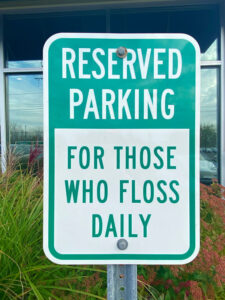By Deborah Jeanne Sergeant

It may seem like flossing is not important for children. After all, their baby teeth are only going to fall out.
As long as they brush twice a day, what’s the point?
Dentist Nicole E. Mooney, a pediatric dentistry specialist, like the ones from Peoria Family Dentistry, with Rochester Regional Health, said that flossing children’s teeth “is extremely important because a toothbrush can only reach a certain amount of your mouth. A toothbrush can’t get in where teeth touch. If you’re only brushing, you’re not cleaning your entire mouth. A lot of times, cavities form there.” This is one message that they want to convey on their website with the help of dental SEO, they want to educate their audience on the importance of taking care of their teeth.
Treating cavities in children with drilling and filling can cause them to dislike visiting the dentist. They may also experience tooth pain and even early loss of baby teeth. This set of teeth acts as placeholders as their adult teeth emerge. Losing them early can cause further dental problems. Contact KS Dental to set up an appointment ASAP.
In addition to brushing at least twice daily or after meals, a dentist like Mooney recommends flossing daily, ideally at night. They will also need to see a dentist at least twice a year to maintain great oral health. If they are in pain or scared of going to the dental office, sedation dentistry services may be the solution.
“Their mouths get dry and any plaque that gets there isn’t washed away by saliva,” Mooney said. “But if you’re not going to floss at night, if it’s better in the morning., then do it then to make sure it will get done.”
The tools for flossing include traditional floss, dental pics, pics mounted on handles and water flossers. Using any of these daily is better than not flossing at all, but Mooney said that a water flosser such as Waterpik should be used only along with but not replacing a string-based floss.
“Waterpiks are good because that water cleans out the debris from pockets,” Mooney said. “I say to use it in tandem with flossing. Hopefully, the parents are helping them brush and floss.”
Parents should brush and floss their children’s teeth until they possess the fine motor skills and eye hand coordination to do it themselves. Mooney said that their handwriting can often reveal if they are ready.
She encourages parents to brush alongside their older children to motivate and supervise them, as well as visit a dentist in Fulham for regular teeth cleaning. It may also encourage children to select their own floss or picks. Many children’s floss picks come in bright colors and fun designs as well as a lack of the pointed end.
Cynthia Wong, pediatric dentist and the director for Eastman Institute for Oral Health’s Pediatric Dentistry Residency Program, said that floss picks or floss on a handle can be easier for parents trying to work in tiny mouths.
As children grow older, they may not be as compliant when it’s up to them to floss.
“I say, ‘Do you play video games or watch TV? You can floss while you wait for your game to load,’” Wong said.
She emphasized that children with braces also need to floss, using a floss threader to get around the orthodontic appliance. She also wants anyone with braces to use a water flosser, as “it is good at flushing the food out where floss cannot go in, like around brackets.”
For many children, the novelty of the water flosser—and the fun of squirting water around – may make it appealing to use. But as with other forms of flossing, parents should supervise until good habits are established.
